Sharp decline in share of Republican voters who are ‘very confident’ that votes cast at polling places will be counted accurately
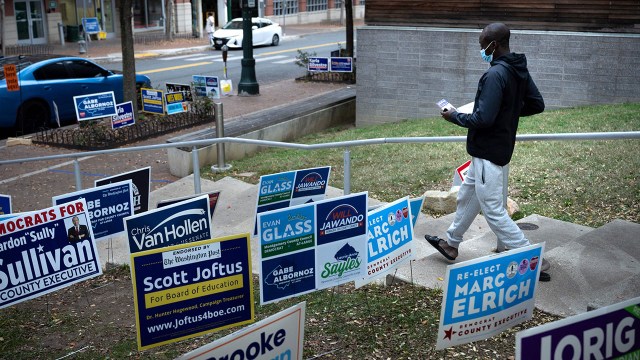
Pew Research Center conducted this study to examine public confidence in the upcoming elections and to better understand the public’s views of various aspects of the voting process. For this analysis, we surveyed 5,098 adults, including 3,993 registered voters, from Oct. 10-16, 2022. Everyone who took part in this survey is a member of the Center’s American Trends Panel (ATP), an online survey panel that is recruited through national, random sampling of residential addresses. This way nearly all U.S. adults have a chance of selection. The survey is weighted to be representative of the U.S. adult population by gender, race, ethnicity, partisan affiliation, education and other categories. Read more about the ATP’s methodology.
Here are the questions used for the report and its methodology.
Two years ago, shortly before the 2020 presidential election, Republicans’ trust in the nation’s election system had eroded considerably. Today, with the midterm elections approaching, widespread GOP distrust persists – and in some cases has deepened.
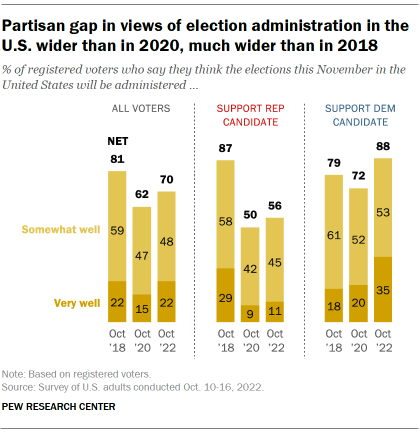
A majority of registered voters who support Republican candidates for Congress in their districts (56%) say they think the midterm elections in the U.S. will be administered very or somewhat well, with just 11% saying they will be run very well. That represents a modest increase from 2020, when 50% of Republican voters expected the presidential election to be run well (9% very well). But it is much lower than the 87% of GOP voters who said this in October 2018, shortly before the last midterm election.
Democratic voters, by contrast, have become more confident that elections will be administered well. An overwhelming share of voters who support Democratic House candidates (88%) say the midterm elections will be conducted very or somewhat well, up from 72% in 2020 and 79% four years ago. The partisan gap in these opinions, which was just 8 percentage points in 2018, has widened to 32 points in the current survey.
Among all voters, 70% say the elections will be administered very or somewhat well; that is higher than the share saying this shortly before the 2020 election and lower than in October 2018 (81%).
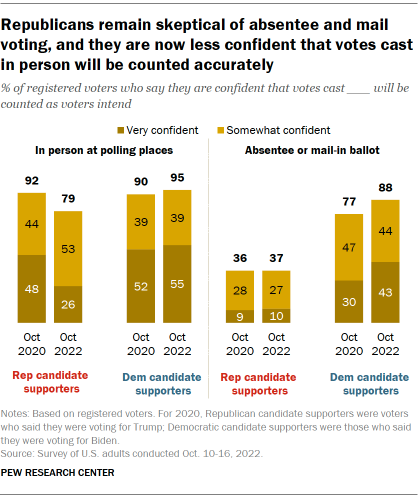
The new national survey by Pew Research Center – conducted from Oct. 10 to 16 among 5,098 U.S. adults, including 3,993 registered voters, on the Center’s nationally representative American Trends Panel – finds that Republican voters, who already lacked confidence in absentee and mail voting, are now also less likely to say they are very confident that ballots cast in person at polling places will be counted as voters intend.
Nearly eight-in-ten voters who back Republican congressional candidates (79%) say they are very or somewhat confident that votes cast in person will be counted accurately – but just 26% are very confident. Two years ago, roughly twice that share of GOP voters (48%) had a high degree of confidence that votes cast at polling places would be counted accurately (92% were very or somewhat confident).
And most Republicans continue to doubt that absentee and mail ballots will be counted as voters intend. Only about four-in-ten supporters of Republican candidates (37%) are very or somewhat confident such ballots will be counted accurately, with just 10% saying they are very confident.
Democrats are overwhelmingly confident in-person votes will be counted accurately and have become more confident in absentee and mail voting. About four-in-ten Democratic voters (43%) say they are very confident these ballots will be counted accurately, up from 30% two years ago. Nearly nine-in-ten (88%) are very or somewhat confident, compared with 77% in 2020.
Former President Donald Trump has repeatedly – and falsely – claimed the 2020 election was “rigged” or “stolen.” Among voters who support Republican congressional candidates, those who express positive views of Trump are less likely than other Republican voters to say they expect that the midterm elections will be administered well and that votes will be counted accurately.
About half of Republican voters (49%) who express “very warm” feelings about Trump (measured on a 100-point “thermometer” scale) say they expect this year’s elections to be administered well; 55% of voters with “warm” feelings toward Trump say the same. But among the roughly one-third of Republican voters with “neutral” or “cold” feelings toward Trump, a much larger share (67%) have positive expectations for the handling of the midterms.
Republican voters who feel warmly toward Trump also are much less confident than those with neutral or cold feelings to express confidence that absentee or mail ballots will be counted as voters intend. And while 45% of Republican voters with neutral or cold feelings toward Trump are very confident that votes cast in person at polling places will be counted accurately, fewer than half of those with warm (19%) or very warm (17%) feelings toward Trump say the same.
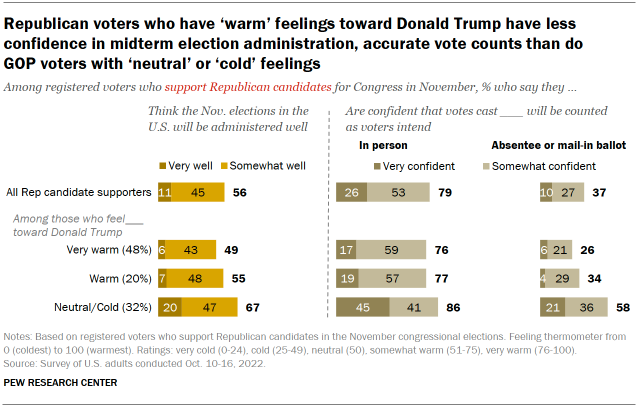
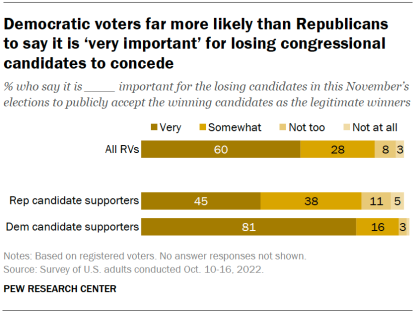
The survey finds that voters generally believe it is important for the losing candidates in the congressional elections to publicly accept the winning candidates as legitimate winners.
However, while a sizable majority of voters who support Republican candidates (84%) say this is very or somewhat important, fewer than half (45%) view it as very important. Nearly all supporters of Democratic candidates for Congress (96%) say it is important for the losing candidate to concede to the winner, with 81% saying this is very important.
Other important findings from the survey
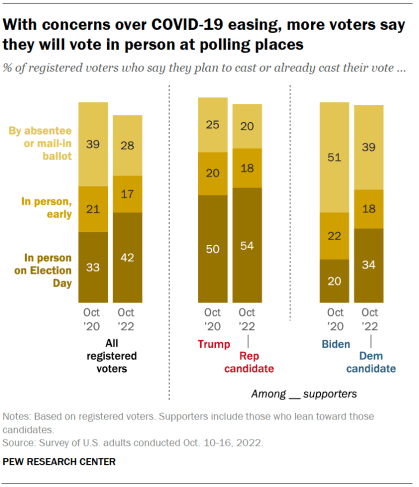
More voters are voting in person. Voting in the 2020 presidential election was severely impacted by the coronavirus outbreak. In October of that year, just a third of registered voters said they expected to vote in person on Election Day. This year, 42% of voters say they expect to vote in person on Election Day, with virtually all of the increase coming among Democratic voters.
Black and Hispanic voters are less likely to say voting in midterms will be “very easy.” Among all registered voters, 83% say they expect that voting in the November elections will be easy, with 45% saying it will be very easy. However, while 49% of White voters say they think voting will be very easy, fewer Hispanic (37%) and Black voters (28%) say the same. Among voters who support Democratic candidates, Black voters are 24 percentage points less likely than White voters to say voting will be very easy (27% vs. 51%).
Fewer Republicans are very confident in local poll workers. Voters overwhelmingly express confidence in the poll workers in their communities to do a good job during next month’s congressional elections. Nearly nine-in-ten (89%) have confidence in poll workers, with 46% saying they are very confident. However, while most voters who support Republican candidates are very or somewhat confident in their local poll workers, just 39% are very confident – down from 60% four years ago. By contrast, the share of Democrats saying they are very confident in poll workers has increased, from 50% to 60% (96% are very or somewhat confident).
State election rules are generally viewed as fair, with some exceptions. A sizable majority of registered voters (84%) say their states’ election rules are fair. However, Republicans living in states where the government is controlled by Democrats – and Democrats living in GOP-controlled states – are less likely than other Republican and Democratic voters to regard their states’ rules as fair. They also are more likely to say the rules are unfairly tilted to the opposing party.
Nearly all Republican and Democratic voters say voting is “important.” While views of election administration are deeply partisan, views of the importance of voting are not. In fact, 97% of voters who back Republican candidates say voting is important; an identical share of Democratic voters say the same. Majorities of all voters also view voting as “convenient,” “straightforward” and “exciting,” although young voters are less likely than older voters to describe voting with these positive terms.


